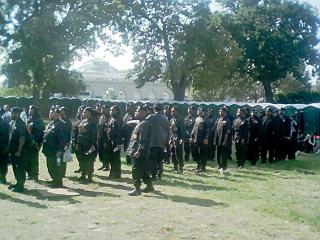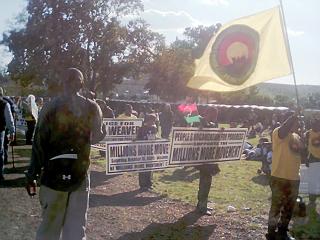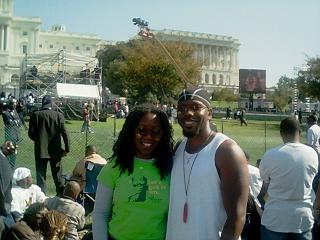Reflections on the Millions More Movement

My Reflections on the Millions More Movement
by Obadiah Holder
October 20, 2005
Special to bluestalkin.blogspot.com
Photos courtesy of Obadiah Holder
I was reading someone’s views and perspectives of the movement held Saturday [October 15, 2005] celebrating the 10th anniversary of the Million Man March. The headline and the first subject was the thought that the author was at the Million More Picnic because so many people were sitting out in chairs eating and conversing.
Now, I am not writing to diss this person's point of view…just stating mine, I guess.
Anyway, at the march 10 years ago it was declared a day of absence. No buying, no work, etc. I went to the march and I observed the day of absence and it was tough. And also being that it was my first such event I didn’t have sense enough to bring a chair. So I got hungry, tired, and weak. By the time Farrakhan got on I was headed back to my group's staging point. I passed by a PACKED KFC and walked on by because I still observed the day of absence. While I walked I listened to the speech on the radio.
This time the day of absence was the day before the march. I think it was great that way because the day of, you were free to go get something to eat if you didn’t have. And food is the key to your energy when you are about to be out from 7 or
It was totally common to see brothas in a cypher just sharing knowledge. Many elders had the ear of a group in conversation. Brothas held hands in circles of prayer. Just an overwhelming experience.
This time I heard the same things in the crowd. A man with the salt and pepper beard breaking it down to a younger cat about how he expects to be greeted and why he cant accept being greeted with “dawg” or “my boy” and slang of that nature. There was another man teaching a kid who was selling those little rubber band bracelets. He was telling him to hold his head up and look a person in the eye when he was doing business with people. I even saw a brother schooling this white guy about the issues ex-slaves faced when they were first freed.
 These are just scenes I observed in passing. Or things I overheard from people near me. So yes. People were talking, and eating. Should we have stood at attention for 7 to 9 hours while waiting for our leader to appear? Dag, even the FOI [Fruit of Islam] were on rotation!
These are just scenes I observed in passing. Or things I overheard from people near me. So yes. People were talking, and eating. Should we have stood at attention for 7 to 9 hours while waiting for our leader to appear? Dag, even the FOI [Fruit of Islam] were on rotation!
Well, this is kind of my reflections on the gathering on the 15th but I won’t do a news report cause you can read that on BET.com, CNN or something. What I DO want to do is hit on a few highlights as well as the key agenda that the minister proposed.
See, to me, last time (the first march) was different in that it did not lay out an agenda. It was the black man's time to apologize, acknowledge his issues and pledge to address them so that we can be more productive etc, etc. “Now go home and be better men!” That’s the feel I got 10 years ago but that is what I expected and that is what I needed. This time there is an agenda for continued movement in many different directions!
Of course throughout the day the aftermath of Katrina was a target. Rightfully so, of course. There were moving words and songs from people who survived it. Al Sharpton had some poignant things to say about it. He just makes you feel like you in church whenever he gets going! And Wyclef took it to Carnivale with an energetic and refreshing, mostly freestyled performance. The Bush administration got an earful. Once again, rightfully so. So, yeah. Bush got bashed. Ain't nothing new. But a key point to it all is that most people concluded by placing a need on us as a collective to come together and move against such injustice.
–Side story: There were a lot of people passing out…stuff! Papers with some kinda info. You had to be selective of what you kept. Anyway there was a group of white people that I saw. And they had a poster that read “Wanted For Mass Murder” and it has what looks like mug shots of Pres Bush, Condoleezza Rice, Dick Chaney, and someone I don’t know. Must be important though, to be included. And it says “The Bush regime is wanted for the murder of thousands of people in the
A key area that Minister Farrakhan emphasized was unifying. He used Katrina, as an example. Explaining that the more organized of a storm it became the stronger it got. The more organized and powerful it became the more respect it demanded because of the destruction it could do. He also told the story of a conversation that took place between someone in African American leadership (I can’t remember everything!) [A. Phillip Randolph] and Franklin D Roosevelt. Point of it being that this black leader was telling
But not only did he stress organization for the power of voicing ourselves collectively to government, but also so that we could build our own and have our own. He said that we should organize to change the reality.
Farrakhan’s plan was that several different ministries should be formed. First mentioned was a Ministry of Health and Human Service to “look after the health needs of black, brown, and poor people.” He said that Fidel Castro once offered hundreds of medical scholarships for people to come to
He also proposed a Ministry of Agriculture saying that if blacks would grow their own food then it would stimulate our own economy because then we would have our own grocery stores, thus creating jobs. Farrakhan also talked about the foods that we eat now and how the food industry and the drug companies work together to aid in sickness with all the fatty foods produced and consumed. Then the pharmacies create a pill to sell and correct the problems. “If we keep our mouth in the kitchen of our enemy we will never have good health,” he said. He also let it be known that the Native American community is willing to lease land to the black community. Land that we could farm and make these things happen. This of course would take organization for such a course of action to be successful.
Other areas in which Farrakhan suggested ministries were:
Ministry of Education—to create a “new educational paradigm”
Ministry of Defense (of course)
Ministry of Art and Culture—to use the arts to not only entertain, but also to educate. Edutainment, if you will.
Ministry of Trade and Commerce—to open up trade and exchange with the
Ministry of Justice
Ministry of Information—so that we could send OUR reporters to find the truth.
Ministry of Spirituality—to “transform our lives by transforming our minds.
Ministry of Science and Technology
Of course he stated the need for the funds to finance these ministries. Though he didn’t stress reparations a lot, he did say that we, as a people deserve reparations and that it would help in funding such an undertaking that he is proposing. But all of that still stems from our level of organization. “The more we organize, the more demands we can make.” He talked of having our own political party. He said it could be the POP—Party of the People.
These proposals, I see as reachable. I think that it will take more than just my lifetime but the foundation can be started now so that our children and their children can have a different world than we have had. I will be staying informed because I want to know how he plans to pull it off. He didn’t lay out the plan for making all of this happen. But I expect that he has a plan. I hope he didn’t put all that out there as empty words. Time will tell.
He did request that everyone go to www.millionsmoremovement.com and complete a registration form and enlist in a national skills bank so that peoples skills and locations can be gathered for future use. Also, for donations to a Katrina Fund and a fund that will be there in case of other disasters to our people we could donate to:
The Millions More Movement Disaster Relief Fund
I invite you to watch the coverage at the MMM website. I also noticed that they have the footage on CSPAN’s website as well.
Like I said, I think these are lofty goals but that they can be reached. I don’t know his plans for organization as of yet but I hope they are laid out soon. I don’t belong to any groups and have been pretty much a loner. But I am more than willing to join and work within an organization in order to build a better future for me and mines!
That’s about it, for now. I thank you for reading all this. Pass it along to anyone you think gives a damn.
Peace, Power, and Blessings!
Obadiah
“The success of our movement won’t come from our race or our numbers. But from the righteousness of our cause.” Jessie Jackson
Obadiah Holder is an IT professional from Nashville, Tennessee.





![[Patrick Fitzgerald]](http://online.wsj.com/public/resources/images/HC-GG364_FitzgeraldPatrick06302005223459.gif)












